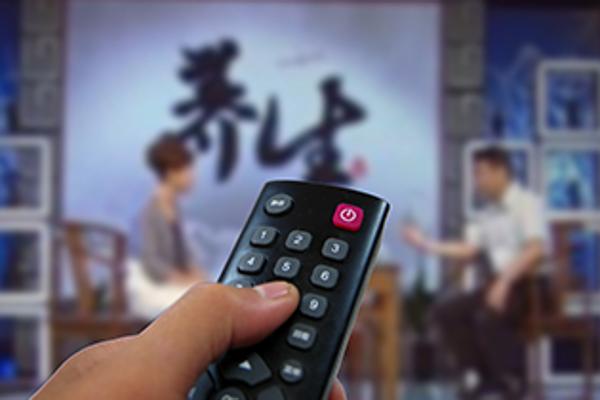
Chinese characters shown on a health TV show read “keeping fit”.[Photo/Provided to China Daily]
New rules for such programs aim at curbing misleading advice and the pushy sell of ungrounded theories on TV.
China’s top media regulator has tightened control over health-related TV programs, in a bid to provide viewers with better scientific content.
Last month, the State Administration of Press, Publication, Radio, Film and Television said that such programs shown on TV must have only qualified doctors and medical experts to advise audiences on the prevention and treatment of diseases. The experts are also required to be certified by health authorities.
Celebrities are barred from hosting health shows.
A circular from the regulator prohibits companies, other than TV stations, from making health-related series, and asks TV stations with poor funding and lacking in expertise to refrain from making such programs.
The programs would need to be reviewed by authorities, and TV channels and production houses that are found to violate the new rules would be penalized.
Recently, health-related Chinese TV programs have become popular among audiences, and TV stations and production houses are suspected of making money from them, according to Chinese media reports.
More than 50 health-related programs are aired on satellite TV channels every week, with many more on local TV stations, media reports say.
In 2012 alone, 108 listed pharmaceutical companies invested about 6.88 billion yuan in TV programs, with most of the money going to health shows, says Qq.com, a major Chinese website.
BTV’s flagship show, Yang Sheng Tang (health classes), registered a high rating and earned more than 43.76 million yuan from advertisements in 2013, the same report adds.
The health programs often have one or more “experts” talking about disease control and remedies, typically in monologues or in conversation with TV anchors and guests who claim to be patients.
Topics vary from show to show, ranging from prevention and treatment of specific diseases, such as diabetes or heart ailments to general advice on how to stay healthy, usually delivered by so-called practitioners of traditional Chinese medicine.
In the past few years, however, a few scandals involving unlicensed practitioners have also broken.
In 2010, for instance, Zhang Wuben, a self-described traditional Chinese nutritionist, became an overnight guru through his food therapy shows on TV, on which he claimed that consuming mung beans and eggplants in large quantities could cure many diseases. But it was later discovered that Zhang’s medical qualifications were fake and that his theories weren’t based on scientific research.
“Irresponsible health programs provide biased information on medicine and medical devices”, and practices that harm people although less noticeable, Zhang Xueliang, director of a training facility under the China Academy of Chinese Medicine Sciences, tells China Daily.
The director says that more often than not, “experts” on health programs say something not commonly acceptable in the medical community and promote theories proven to be ungrounded.
“You can’t tell if the so-called expert is trying to sell products or wants attention or simply doesn’t have the right information,” Zhang Xueliang says, adding that wrong information can mislead audiences and lead to improper treatment of diseases.
A senior Beijing-based producer of TV health programs, speaking on condition of anonymity, says that such programs have gained in popularity for a number of reasons that include an aging society and the country’s rapid economic progress.
According to the producer, senior citizens with poor scientific training, form the bulk of the viewing population for health-related TV shows. The elderly are easily overwhelmed by the so-called experts and celebrities presenting health programs.
“The line between a proper program and an advertisement is often unclear,” he says, citing the case of filming patients’ experiences that could either be true or fabricated to hard-sell a product or service. “Without regulations and punishments, it would all depend on a program producer’s conscience whether or not to cross the line.”
While the anonymous producer welcomes the new rules that will take effect in 2015, he also hopes that genuine problems of the TV industry will be addressed through regulations, too.
